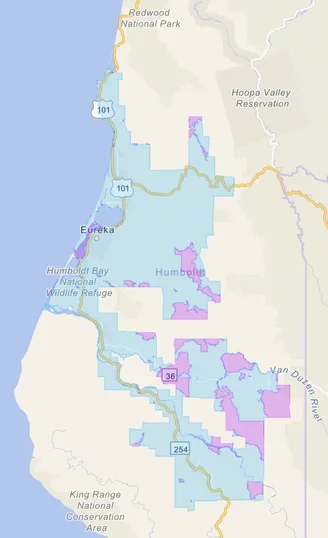###
At its monthly meeting on Thursday, the California Public Utilities Commission (CPUC) is expected to issue a decision on AT&T’s proposal to disconnect landline services for thousands – likely hundreds of thousands – of California customers.
At the beginning of this year, AT&T California applied to remove its status as a Carrier of Last Resort (COLR), which requires the telecommunications giant to provide analog telephone service, or “plain old telephone service,” to residential and business customers. If the application is approved, AT&T will no longer be required to provide landline services in certain areas of Humboldt County, including much of Arcata, Eureka, Fortuna, McKinleyville, Rio Dell, Trinidad and smaller communities along Highway 101 and State Route 299.
AT&T argues that the “outdated” COLR obligation has forced it to “wastefully operate and maintain two duplicative networks: one, an antiquated, narrowband network with an ever-dwindling base of subscribers, and the other, a forward-looking, fiber and wireless broadband network,” as stated in the executive summary of the application.
Elected officials, including state Sen. Mike McGuire, and concerned customers have spoken out against the “dangerous” proposal, fearing it could leave vulnerable residents without reliable phone service.
Last month, the CPUC issued a statement indicating it would reject the proposal due to AT&T’s “fail[ure] to demonstrate the availability of replacement providers [that would be] willing and able to serve as COLR.”
“As the designated COLR, AT&T plays a pivotal role in providing reliable telephone service to communities across the state,” the May 10 statement argues. “Despite AT&T’s contention that providers of voice alternatives to landline service – such as VoIP [Voice over Internet Protocol] or mobile wireless services – can fill the gap, the CPUC found AT&T did not meet the requirements for COLR withdrawal.”
The CPUC received over 5,000 virtually submitted public comments in response to the proposal, many of which “highlighted the unreliability of voice alternatives such as mobile wireless or VoIP,” according to the CPUC.
“With the proposal to dismiss AT&T’s withdrawal request, the CPUC reaffirms its commitment to safeguarding access to essential services and maintaining regulatory oversight of the telecommunications industry,” the statement continues. “Importantly, COLR rules are technology-neutral and do not distinguish between voice services offered (such as Plain Old Telephone Service (POTS), commonly known as landline service, or VoIP), and do not prevent AT&T from retiring copper facilities or from investing in fiber or other facilities/technologies to improve its network.”
AT&T will have a chance to defend its position at the CPUC’s meeting on Thursday. A copy of the proposed resolution can be found here.

CLICK TO MANAGE